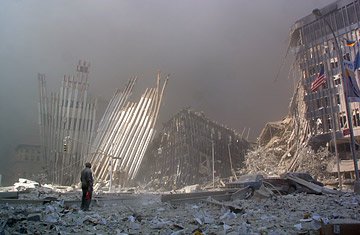
A man stands in the rubble, and calls out asking if anyone needs help, after the collapse of the first World Trade Center Tower in New York City on September 11, 2001.
(7 of 10)
Captain Pat Brown, 48, always said the New York City fire department had saved his life. He came home to Queens from Vietnam in 1973 covered with medals but angry and choked up on adrenaline, daring anyone to knock the chip off his shoulder. Not good qualities for most jobs--unless you need to suit up every day against an adversary like fire. He made some spectacular rescues, including a courageous save as a lieutenant in 1991 on the roof of a midtown office building: Brown and two of his men held an inch-thick rope in their bare hands and, straining and skidding toward the parapet, lowered two fire fighters, one at a time, down into black, billowing smoke; each man grabbed a panicky victim from a windowsill perch. The lunchtime crowd below went wild with relief.
Brown eventually became one of the most decorated members in the history of the department. Women were attracted by the face, the Cagney voice and the "hero" who made the papers--including the time he chased down a mugger in Central Park during his workout. But he was restless. Brown, who never married, gave up drinking and late nights to read up on religion, get a black belt in karate, learn yoga. He volunteered as a self-defense teacher for the blind. The honors and citations didn't mean what they once did, as he watched mentors and proteges die in fires. Still, he loved fire fighting. Last Tuesday his company got the call to go to the World Trade Center. Fire fighter Brandon Gill says someone yelled, "Don't go in there, Paddy!" but Brown called back, "Are you nuts? We've got a job to do!" and rushed up the stairs of the north tower with his men, past the engine companies with their hoses, to look for trapped office workers. Said Gill: "One of the newspapers called him 'the gallant Captain Pat Brown.' That's exactly what he was." --By Ellin Martens
Questions of Chance
"Shallow men believe in luck," Ralph Waldo Emerson famously wrote, but World Trade Center employees who happened to miss work on Sept. 11 must think him a fool. We heard these stories all week, and they gave us a national case of goose bumps: the bus from Staten Island missed for the first time in four years, the car that needed repairing, the long-debated trip to Israel taken last week that proved safer than staying home. Even the most rational person lists toward superstition after hearing the stories. Was there a reason? Is God making choices? Why me?
The questions haunt the fortunate. Rob Garrard, 45, worked for IBM on the 97th floor of 1 World Trade Center. According to his hometown paper in Plymouth, England, Garrard's sister said he escaped death by "sheer fluke... He was late leaving home because he had to make some calls, then he took the bins out and had to catch a later train." Such are the mundane "run of events," as Garrard later called them, that change fate. He arrived at work an hour and 10 minutes later than usual and was waiting for the elevator when Flight 11 crashed. Few people who worked as high as 97 survived. "He lost a lot of friends," says his wife Bridgette. "He's completely devastated."
